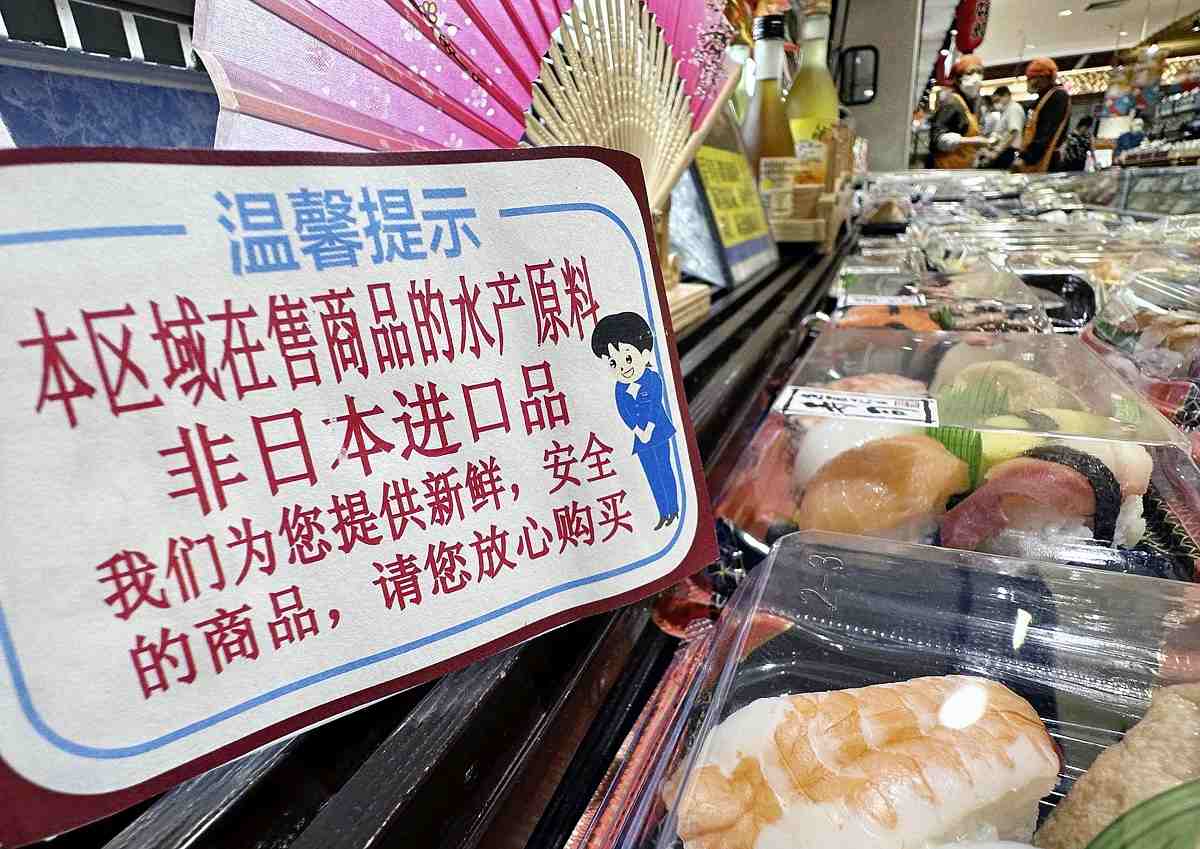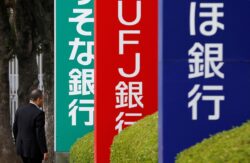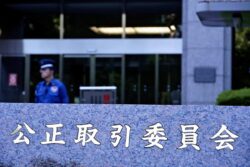Fukushima Water Release Casts Shadow over Japan Firms in China; Businesses Struggle to Deal with Seafood Ban

A sign reads “Seafood is not imported from Japan” in the sushi section of a Japanese-affiliated supermarket in Beijing on Monday.
17:03 JST, August 30, 2023
Japan-linked businesses in China are struggling to deal with China’s total ban on the use of Japanese seafood, as well as negative public opinion in China, following the start of treated water being released into the ocean from the Fukushima No. 1 nuclear power plant.
Once seen as synonymous with safety and security, “Japanese-style” businesses are now facing strong headwinds. Japanese restaurants and Japanese companies in China are being forced to make difficult decisions about how to continue doing business in this huge market.
Not using Japanese ingredients
Hama-Sushi Co., which runs a chain of conveyor-belt sushi restaurants, had stopped using any Japanese ingredients at all of its 34 restaurants in China’s mainland as of Friday. The company announced that fact on its official Chinese social media accounts on Saturday, but deleted the post the following day.
The post said, “Let’s protect food safety together,” which could be interpreted as the firm ensuring safety by not using Japanese products.
“When drafting the post, Hama-Sushi in China drew on expressions used by other restaurants around them, taking into account the local press and consumer opinions,” according to a spokesperson of Zensho Holdings Co, the parent company of Hama-Sushi. “This does not represent the thinking of Hama-Sushi in Japan.”
The sushi restaurant Chitian Sushi Express, called “Ikeda Sushi” in Japanese, is funded by Chinese capital and stands in a commercial facility in the suburbs of Beijing. Since Thursday last week, the day the release of treated water began, the sushi restaurant has displayed a sign on its storefront readying: “We don’t use Japanese ingredients. Please enjoy the food you choose without worry.”
Previously, the restaurant’s Japanese-style name had provided a clear advantage, but the restaurant reversed course and responded to the possible risk of intense consumer criticism.
At a store owned by furniture giant Nitori Holdings Co. in the same commercial complex, “Made in Japan” and “Japanese style” are prominently displayed throughout the store.
The company aims to emphasize the “made in Japan” quality of its mainstay household products, but a store official said, “Recently, more and more customers are concerned about the fact that the products are made in Japan.”
Additional inspections
According to Teikoku Databank Ltd., 9,270 companies in Japan exported to China as of August, including 727 firms exporting food and 264 exporting beauty products, including cosmetics.
Since the decision to release the treated water, Procter & Gamble Co.’s Japanese SK-II luxury cosmetics products for China have been independently tested for radiation levels by a third-party inspection organization recognized by the Chinese government, in addition to the company’s own quality testing.
Likewise, Kao Corp. has been conducting radiation testing since the 2011 nuclear accident in Fukushima Prefecture on cosmetics and daily necessities that are legitimately exported from Japan to foreign countries, including China.
“There are no problems with the environment or product safety in any of our factories,” a Kao spokesperson said.
“It remains to be seen how far the boycott will spread, but we can’t be optimistic about the impact,” a member of the cosmetics industry said.
Chinese tourists
The ban on group travel from China to Japan was lifted in August. Purchases by Chinese visitors at Japanese department stores are rising, but still lower than before the pandemic.
“The number of Chinese customers visiting our stores dropped when the issue of the Senkaku Islands occurred in 2012. There hasn’t been a similar effect this time around,” an official of a major department store said.
A major restaurant chain operator said it received prank calls last weekend at its chain stores in central Tokyo, including those in Shinjuku and Shibuya wards.
“[The prank calls] are causing problems for our business, as we can’t respond to regular inquiries,” the firm said.
“With Chinese public sentiment toward Japan deteriorating, the situation is similar to that at the time of the Senkaku dispute,” said Kokichiro Mio, senior researcher at NLI Research Institute. “Seafood businesses have been directly affected, and the recovery of tourism to Japan may also be hindered.”
Top Articles in Business
-

Japan, Italy to Boost LNG Cooperation; Aimed at Diversifying Japan’s LNG Sources
-

Honda to Launch New Electric Motorbike in Vietnam
-

Asics Opens Factory for Onitsuka Tiger Brand in Western Japan
-

Japan’s ANA to Introduce Nationwide Logistics Service Using Drones, Will Be Used to Deliver Supplies in Remote Areas
-

JR Tokai, Shizuoka Pref. Agree on Water Resources for Maglev Train Construction
JN ACCESS RANKING
-

Univ. in Japan, Tokyo-Based Startup to Develop Satellite for Disaster Prevention Measures, Bears
-

JAL, ANA Cancel Flights During 3-day Holiday Weekend due to Blizzard
-

China Confirmed to Be Operating Drilling Vessel Near Japan-China Median Line
-

China Eyes Rare Earth Foothold in Malaysia to Maintain Dominance, Counter Japan, U.S.
-

Japan Institute to Use Domestic Commercial Optical Lattice Clock to Set Japan Standard Time
























